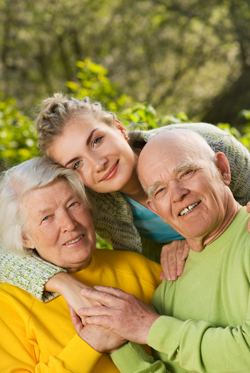HEALTH - SENIORS
Summer & Seniors:
How to Enjoy the Warm Weather without Worry
May, 2010 - Issue #67
 |
It's especially important that caregivers, neighbors and friends make regular visits during the hottest summer months, when seniors may need some help coping with the rising thermometer.
By paying closer attention to hydration, indoor air temperature and activity levels, home-bound seniors - and those who may care for them - can better enjoy the season.
Hydration
Many seniors are not well hydrated, and this becomes critical during hot weather. "The senses that trigger thirst can decrease as we age, so seniors sometimes forget to drink enough. Add in the fact that some medications and medical conditions can also affect hydration - and throw in some hot days - and it's easy to slip into dangerous dehydration," clarifies Geneva Knoles, director of Visiting Angels of Santa Clarita.
"The most important three words any time of year," pontificates Myles McNamara of Comfort Keepers In-home Care, "are hydration, hydration, hydration." Dehydration is one of the leading causes of hospitalization for seniors. "We've all heard about how we should drink eight glasses of water, at a minimum, per day, but there are health factors and medications that can alter that amount. Check with a doctor and find out what's necessary," says McNamara.
Keeping Cool
Another common safety (and comfort!) issue is keeping the living environment cool enough. "Some frugal seniors are reluctant to turn on the air conditioning, and therefore unnecessarily cope with extreme heat in their home. Families can call their power company to inquire about rate saving plans for low income seniors or install free-standing AC units that can cool only the rooms most frequently used. Be aware that there are people in our community with early dementia who are living alone, and their dementia may cause them to not make the decision to turn on the AC or even forget how to use it," reminds Knoles of Visiting Angels.
Exercise
"Physical activity is great for seniors - and so is fresh air - but the California heat can take its toll," reflects Charlene Perrone, a certified senior advisor (CSA) and owner of Home Instead Senior Care.
Instead of fitting activities into the hottest part of the day, try to walk or do errands in the early morning hours when the temps are cooler, says Perrone. Frequent locations that are air conditioned, like the mall or the local senior center. Both host informal and/or formal fitness opportunities in a cool, climate-controlled environment. "And take your time, whatever you're doing. Rushing around in hot weather isn't good for anyone, no matter what age," reminds the Home Instead professional.
For caregivers worried that their loved ones aren't getting enough activity, there are ways to increase movement. "Many seniors refuse to go out because it's so hot, but it's still important to keep moving. Encourage them to walk from room to room, or down the hall to keep their bodies active. They can also exercise in place while watching TV or reading," she says.
After exercise, a cold treat may be in order. "Seniors can eat foods that are cold like ice cream or fruit popsicles - even frozen Ensure. That's a good way to stay cool and refreshed, and get some nourishment at the same time," informs Perrone.
Of course, there's no one-size-fits-all solution to a senior's summer activities. Consulting with a medical professional is a must, reminds Myles McNamara, CSA and owner of Comfort Keepers In-home Care.
"First, it is important that you are involving the physician of your loved one in determining what an appropriate activity level is based on age, health and other factors. If you are experiencing difficulty in the cooperation of your parents, having their doctor or other third party professional giving council is, most of the time, an easier dynamic than a family member 'nagging' at them. We still have to be sensitive to their independence and dignity," explains McNamara.
What to Do when the Worst Happens
According to Griswold Special Care vice president Diane Walker, RN, MS, deaths from heat-related illnesses are on the rise. Over an average summer, about 1,500 people will lose their lives in these events. That's why it's so important to know the signs and how to take action if you suspect that someone is succumbing to the heat.
"Heat-related illnesses include heat cramps, heat exhaustion and heat stroke," says Walker. "They occur when the body is dehydrated and can't lower its internal temperature normally. Dehydration is a condition where the body lacks sufficient water and electrolytes to function properly." Walker cites Dr. Jane Potter, president of the American Geriatric Society, who explains why older adults are most at risk for heat-related deaths. "Changes in physiology cause older people not to sweat as much as younger adults, and sweating is how the body lowers its temperature. Older adults can't just use fans because they work only when someone sweats. Older adults need to spend time in air conditioning, take cool baths or spray themselves with water to lower their body temperature."
"The most common symptoms of dehydration include thirst, going to the bathroom less often, dry skin, fatigue, light-headedness, dizziness, confusion and increased heart rate and breathing. In mild cases, simply drinking fluids, particularly sports-type drinks, effectively restores lost body fluids," informs Walker.
More serious cases, which require immediate medical attention, include heat exhaustion and heat stroke. "Someone with heat exhaustion may have muscle cramps, fatigue, headache, nausea and vomiting, and dizziness or fainting. The skin is often cool, the pulse rate fast and weak, and the breathing is rapid and shallow. Untreated heat exhaustion can lead to heat stroke, which is a life-threatening condition. These individuals have a high temperature; red, hot, dry skin; rapid, strong pulse; throbbing headache; dizziness; nausea; confusion; and may be unconscious," she says.
If you suspect that someone is suffering from heat exhaustion or heat stroke, take action immediately. Have someone call for immediate medical assistance while you begin cooling the affected person.
According to Dependable Senior Assistants, the Center for Disease Control (CDC) recommends the following:
• Get the person to a shady area.
• Cool the person rapidly, using whatever methods you can, for example:
O Immerse the person in a tub of cool water
O Place the person in a cool shower
O Spray the person with cool water from a garden hose
O Sponge the person with cool water
O If the humidity is low, wrap the person in a cool, wet sheet and fan him or her vigorously
• Monitor body temperature and continue cooling efforts until the body temperature drops to 101 or 102 degrees.
• If emergency medical personnel are delayed, call the hospital emergency room for further instructions.
• Do not give the person alcohol to drink.
• Get medical assistance as soon as possible.
For more Information & Support
Comfort Keepers In-home Care 287-4200
Dependable Senior Assistants 886-9358
Griswold Special Care 877-877-1374
Home Instead Senior Care for Santa Clarita and the Antelope Valleys 254-8701
Visiting Angels of Santa Clarita 263-2273
Summer Caregiving Tips at a Glance
• Visit older adults at risk at least twice a day and watch them for signs of heat exhaustion or heat stroke.
• Make sure they are keeping themselves hydrated by drinking plenty of cool water.
• Encourage them to avoid beverages with caffeine or alcohol. Alcohol, in particular, increases dehydration.
• Take them to air-conditioned locations if they have transportation problems.
• Make sure older adults have access to an electric fan whenever possible.
• Keep in mind that if you see any signs of severe heat stress, you may be dealing with a life-threatening emergency.
Tips courtesy of Dependable Senior Assistants.
|
||||||||||||||||||||||||||||




